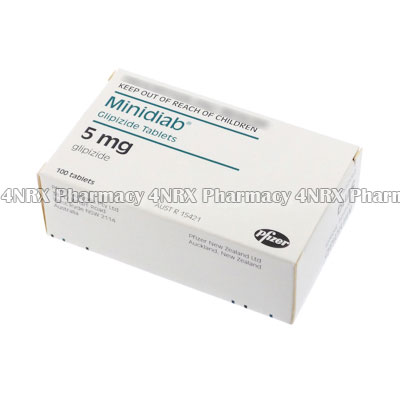 |
Home  Diabetes Diabetes  Minidiab (Glipizide) Minidiab (Glipizide) |
|
|||||||||
|
|
Minidiab (Glipizide)
What is Minidiab (Glipizide) used for? Minidiab (Glipizide) is an oral medication prescribed to treat patients with type 2 diabetes. It balances blood glucose levels to prevent symptoms associated with this condition such as vision problems, nerve pain, or kidney damage. The medication is normally prescribed along with exercise and a balanced diet to get the most effective results. Your physician may prescribe it to treat other unlisted conditions, as well. How should I use Minidiab (Glipizide)? Minidiab (Glipizide) should be used according to your physician's instructions to get the most effective results from treatment. The correct dosage will be determined by your weight, age, health condition, and the severity of your symptoms. These should be taken with a full glass of water after a meal. Do not split, chew, or crush the tablets before use to prevent destroying or altering the effects of their contents. Ask your physician any questions you have about the medicine to ensure the correct administration. What are the side effects of Minidiab (Glipizide)? The use of Minidiab (Glipizide) may cause side effects in some patients including:
Serious side effects that may require emergency medical attention are sensitive skin, increased bleeding, intense headaches, severe nausea, vomiting, increased heart rate, darkened urine, discolored stools, or jaundice. Inform your physician as soon as possible if you experience any symptoms that are intense or worrying to make sure the correct changes are made to your dosage to prevent further complications. Please Note Do not use Minidiab (Glipizide) if you are pregnant, breastfeeding, taking any miconazole medications, or if you have type 1 diabetes, diabetic ketoacidosis, porphyrias, or severely reduced liver or kidney function. Also disclose if you are elderly or if you have decreased liver or kidney function as these condition may cause unexpected problems during treatment. Strictly follow all instructions provided to you by your physician or pharmacist while using Minidiab (Glipizide). Optimum and safe dosage can differ based on the patient and the condition being treated. As this medication may be unsafe for certain patients, it is essential you always inform your physician if you are pregnant or breastfeeding, as well as if you have any allergies, other illnesses, or ongoing health conditions, and if you are taking any other form of medication, supplements, or herbal products. Immediately seek emergency medical care if you have an allergic or hypersensitive reaction. Common signs of a reaction include hives, swelling, skin rashes, chest pains, as well as trouble breathing or swallowing. 
|
||||||||||||||||||||||